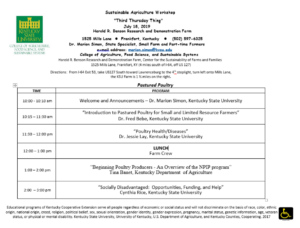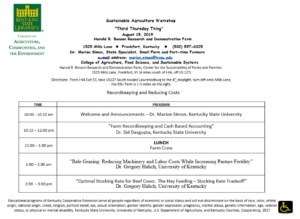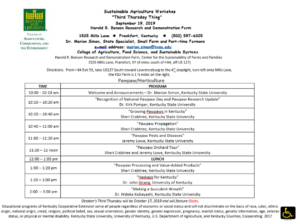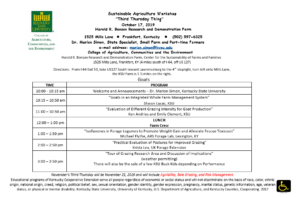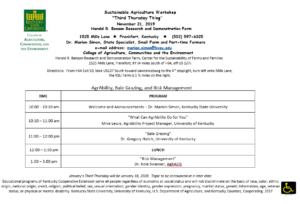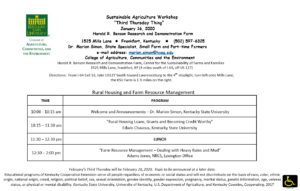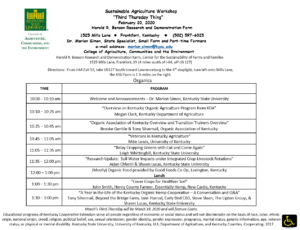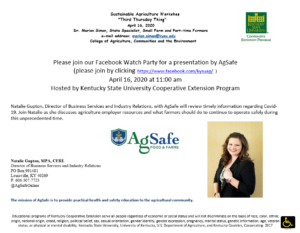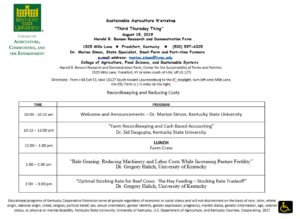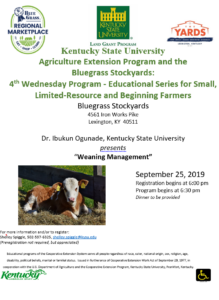Final report for SKY19-002
Project Information
The Third Thursday Thing features monthly sustainable agriculture training sessions. The sessions take place at the Kentucky State University Harold R. Benson Research and Demonstration Farm on the third Thursday of every month with no session in December. Agricultural Professionals and farm leaders throughout the commonwealth and surrounding states are the target audience for the trainings. These trainings are structured for multiple learning types, with lecture style presentations followed by hands on demonstration/activities. We have also added a Fourth Wednesday program based on requests from the agricultural community.
Third Thursdays have become an institution in Kentucky professional development educational programming. The broad range of topics (listed in a later section) ensure that agricultural professionals and producer leaders have training in the skills necessary on a diversified small farm. TTT also serves as a space for synergies in small farm education. Many conferences and educational meetings are planned around “Third Thursdays” including:
o the Annual Small, Limited-Resource/Minority Farmers Conference,
o the International Pawpaw Conference,
o the Regional SARE Goat Project’s Collaborator Conference,
o the SRRMEC Regional Conference on the “Risk-Assessed Business Planning for Small Producers” curriculum, and many others.
– Expand programming to include “quality of life” principles of Sustainable Agriculture through discussions of farm transition.
– Build capacity for these kinds of conversations by training-the-trainer and then supporting trainees in hosting their own local follow-up meetings.
Advisors
- (Educator and Researcher)
- (Educator)
- (Educator)
- (Educator)
- (Educator)
- (Educator and Researcher)
- (Educator and Researcher)
- (Educator)
- (Educator)
- (Educator)
- (Educator and Researcher)
- (Educator)
- (Educator)
Education
Kentucky State University continues to make the Third Thursday Program the focus of its SARE MSP funding. KSU has also added a Fourth Wednesday Beef Education program to the MSP in response to needs from this community. Third Thursdays continue to be an institution in Kentucky professional development educational programming, and Fourth Wednesdays are quickly gaining ground in this regard. The broad range of topics (listed below) ensure that agricultural professionals and producer leaders have training in the skills necessary on a diversified small farm. TTT also serves as a space for synergies in small farm education including educator-to-educator, farmer-to-farmer, and farmer-to-educator interactions
Education & Outreach Initiatives
To expose participants to topics related to pastured poultry production and marketing.
Total attendance: 39
Males: 22
Females: 17
Veterans: 8
Hispanic: 1
Non-Hispanic: 38
Caucasian: 34
African-American: 3
Other: 2
To expose participants to topics, tools, and practices to help in recordkeeping and reducing costs for their operations.
Total Attendance: 26
Veterans: 3
Non-Hispanic: 26
Males: 17
Females: 9
African-American: 5
Caucasian: 21
To expose participants to pawpaw production and cover other timely updates for horticulture production and marketing.
Total attendance: 138
Veterans: 16
Hispanic: 1
Non-Hispanic: 137
Male: 73
Female: 65
Under 18: 18
Caucasian: 115
African-American: 6
Asian/Pacific Islander: 5
American Indian: 2
Other: 7
To expose participants to topics related to producing and marketing meat goats.
Total attendance: 54
Veterans: 12
Hispanic: 4
Non-Hispanic: 50
Male: 31
Female: 23
Under 18: 4
Caucasian: 42
African-American: 8
Asian: 1
Other: 2
To make participants aware of programs available to help farmers of all abilities continue or begin farming.
To introduce the basic principles of bale grazing--a practice has implications for both environmental and economic sustainablity.
To introduce participants to concepts of risk management and resources to help mitigate and manage risks.
Total attendance: 69
Veterans: 9
Hispanic: 2
Non-Hispanic: 67
Males: 35
Females: 34
Under 18: 1
Caucasian: 37
African-American: 22
Asian/Pacific Islander: 2
American Indian/Alaskan Native: 2
Other: 3
To expose participants to topics related to resources and offices available to support rural and agricultural communities.
Topic: Rural Housing and Farm Resource Management
Total attendance: 47
Veterans: 7
Hispanic: 0
Non-Hispanic: 47
Male: 24
Female: 23
Under 18: 2
Caucasian: 34
African-American: 10
Asian/Pacific Islander: 1
American Indian: 1
Other: 1
To expose participants to topics related to Organic production and marketing.
Total attendance: 72
Veterans: 17
Hispanic: 1
Non-Hispanic; 70
Males: 41
Females: 31
Under 18: 3
Caucasian: 58
African-American: 11
American Indian: 2
Other: 1
To expose participants to topics related to staying safe during the pandemic.
Conducted via Zoom
Attendance: 242
To expose participants to real-world beef management techniques.
No agenda for this meeting. Participants were led on a guided farm tour and allowed to observe the operation and ask questions based on items they have learned in other Fourth Wednesday programs as well as in any issues that have arisen in their own production work.
Total attendance: 20
Veterans: 4
Hispanic: 0
Non-Hispanic: 20
Males: 11
Females: 9
Under 18: 2
Caucasian: 11
African-American: 8
Other: 1
To expose participants to topics related to
Total attendance: 19
Veterans: 4
Male: 14
Female: 5
Hispanic: 0
Non-Hispanic: 19
Under 18: 2
African-American: 12
Caucasian: 7
To expose participants to topics related to
Total attendance: 10
Non-Hispanic: 10
Veterans: 2
Caucasian: 3
African-American: 6
Other: 1
Males 7
Females: 3
To expose participants to topics related to Winter cattle feeding
No agenda available.
Presentation by Dr. Ken Andries (KSU)
Total attendance: 24
Veterans: 4
Hispanic: 0
Non-Hispanic: 24
Under 18: 2
Caucasian: 10
African-American: 13
Other: 1
To inform producers on diagnostic and treatment options related to BVD.
Presented via Zoom by Dr. Jessie Lay (KSU)
link below:
https://www.youtube.com/watch?v=s9o5SBAgDWQ&ab_channel=KYSUAG
Attendance: 15
Educational & Outreach Activities
Participation Summary:
Learning Outcomes
Project Outcomes
Many conferences and educational meetings continue to be planned around “Third Thursdays” including:
-
- the Annual Small, Limited-Resource/Minority Farmers Conference,
- the International Pawpaw Conference,
- the Regional SARE Goat Project’s Collaborator Conference,
- the SRRMEC Regional Conference on the “Risk-Assessed Business Planning for Small Producers”curriculum, and many others.
SSARE MSP funding allows KSU to carry on its tradition of serving minority and limited resource producers through its extension system. Training extension personnel, NRCS, other ag service providers, and producer leaders helps to amplify the message of SARE to this group.
Face of SARE
Kentucky’s SARE PDP program objective is to build a broad base of interest and skills in agricultural sustainability among extension agents and other professionals in the state, equip them with the needed skills to assist farmers, marketers, and community leaders, and to facilitate a diverse range of collaborative projects. The way that we manage our programs has led to strong partnerships with the Kentucky Department of Agriculture, NRCS, FSA, Community Farm Alliance, Kentucky Center for Agricultural and Rural Development, the Cooperative Extension Service, Grow Appalachia, as well as grower groups across the state
Our Program Assistant continues to serve as one of the primary faces of the KYSARE program. He networks extensively across the state and beyond to identify new partners and new ideas for amplifying our financial investment. The core job of KY SARE’s Program Assistant is coordinating all of the SARE-promoted trainings and programs. This includes working with the content providers (faculty, private sector, government, NGO) and SARE leadership to develop effective programs. He provides logistical support (finding meeting space, arranging travel, access to materials) and assisting program evaluation.
The Program Assistant also manages the SARE grant funds, helping with budgets, arranging for reimbursement and overall management. Because sustainable agriculture programs in Kentucky extend much beyond the SARE-supported programs, the program assistant actively participates in other activities. This includes attending extension and grower events where he simultaneously represents KYSARE and the UK Center for Crop Diversification, allowing him to provide SARE resources anywhere they might be helpful and relevant. His engagement and connections markedly enhance the visibility of the SARE Program. He is actively involved in Kentucky State University’s “Third Thursday Thing”—monthly sustainable ag field days covering a wide range of topics. The current Program Assistant has strong networking and leadership skills that help us build productive partnerships with Farm Services Agency, Kentucky Department of Agriculture, and numerous NGOs. The program assistant also oversees reporting and proposal development.
